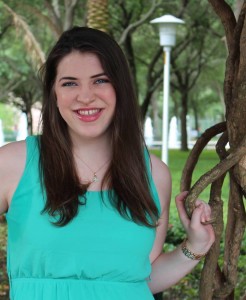Mid-American Review would like to feature Winter Wheat Festival of Writing Coordinator and poetry editor, Coral! 
Coral Nardandrea hails from Ocala, Florida, a small horse town landlocked in a state known for its oceans, swamps, and glades. She got her undergraduate degrees in creative writing and women’s studies, which complemented each other more than you’d think. She came to Bowling Green to get her MFA in poetry and to get to know another small, landlocked town. This year, Coral is coordinating Mid-American Review’s Winter Wheat Festival of Writing and serving as an assistant editor on MAR’s staff. She’s enjoying the other side of the country (and its seasons) so far, though she wishes there were more trees.
Q: What drew you to the writing world?
C: Just a love of stories, really. I started making up stories when I was pretty little—all of my toys had extensive, dramatic backgrounds. Each time I sat down to play, I had to decide what the story was—who was related to who, their likes and dislikes, where they were from, what their goals were. Eventually I started writing those things down, because acting them out wasn’t enough. I was always reading, too, and that really nourished my imagination.
That shifted a bit, of course. In college, I was converted from fiction writing to poetry, and my appreciation of words and what they can do is always growing. While I still lean towards the narrative—a good character, a good story—my understanding of how words shape that narrative is much deeper.
Q: How has your time in the MFA been?
C: I really enjoy the writing community we have here. Our cohort is very close-knit, and it’s amazing to be surrounded by people who are creatively wired, who can discuss the pros and cons of Sylvia Plath’s rise to fame over a beer or two, and who will make time for a road trip to see Rita Dove in the middle of a school week. My writing has also really improved from being immersed in poetry and connected with people who love it.
Q: What makes you want to accept a submission?
C: I’m always looking for something that makes me perk up a little. If the language can make me say, “Oh, that’s different from the fifty other submissions I’ve read today,” I’m perking up. Also, the fiction writer in me always loves a good narrative. Poems have to matter. You have a short amount of time to pack a punch, to tell me something important, and I want to feel changed by the time I’ve finished your poem.
Q: What’s your favorite story/poem MAR has accepted?
C: This is hard! “Lesson” by Christina Duhig was a poem I fought hard for when we discussed its publication, so it has a special place in my heart. But I think my all-time favorite has to be coming up in Volume 37: Matthew MacFarland’s “Mosaic Floor Depicting the Rape of Persephone, Uncovered at a Tomb in Amphipolis, Greece, October 2014.” There’s just something so quietly haunting about it. It’s a powerful poem. I’m so excited for everyone to read it.
Q: What’s the best advice a writer has given you?
C: I’m lucky to have a lot of mentors in my life who give amazing advice. Probably the most helpful thing I’ve ever been told is to be kinder to myself. To stop saying “should.” There’s enough rejection in the writing business without adding my own doubts before I can submit a packet to a journal or print a poem off for workshop. I’m still working on this, but respecting my poetry for what it is has helped make me a more confident writer.
Q: Best experience in Bowling Green so far?
C: Honestly, each week has been its own grand adventure. Spending time with those in my cohort, whether we’re watching trashy television, staking out the Black Swamp Festival, or riding every coaster at Cedar Point, has always left me with a story to tell or an inside joke to reference. The people have made my experience here, and I’m glad to know them.
